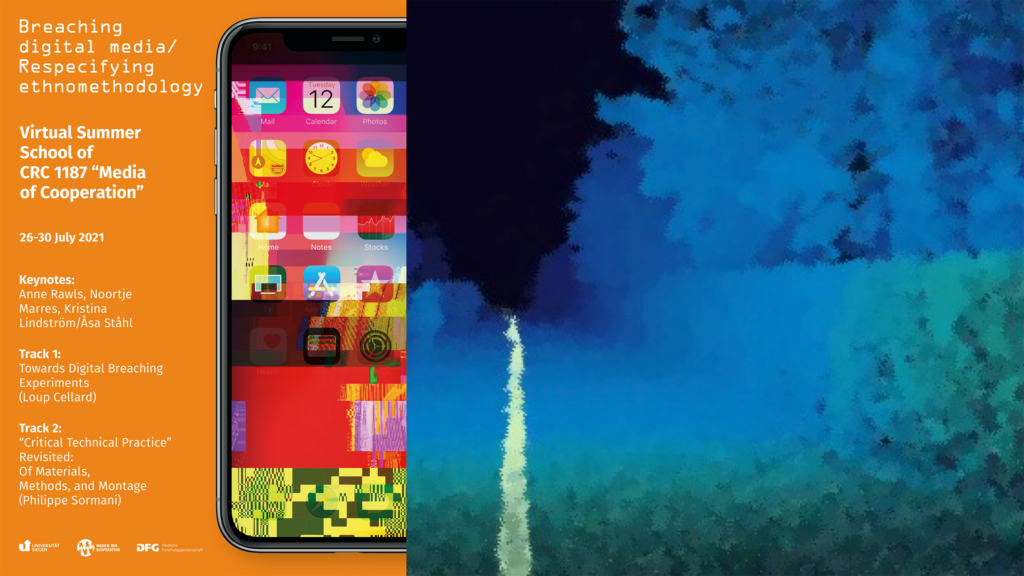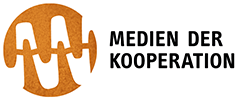MGK - Integrated Research Training Group
Principal Investigators:
„The MGK is the central location for teaching and innovating methods. It contributes significantly to the CRC's overarching goal of conducting basic digital research and communicating, reflecting on and developing innovative methods. The MGK trains doctoral candidates in an internationally oriented, interdisciplinary program.“
Executive Summary
The "Integrated Research Training Group" (MGK) module set up in the second funding phase has developed into the central location for doctoral training and makes a significant contribution to the SFB's overarching goal of carrying out fundamental digital research and innovative method development. Through university-financed doctoral positions and scholarships, MGK has been able to expand the range of sub-project topics and make a significant contribution to developing digital praxeology.
In the third funding phase, MGK is also the location of the internationally oriented, interdisciplinary doctoral training, which runs across SFB's sub-projects. In terms of content, MGK follows the claim of SFB to investigate cooperation in sensor-intensive environments. It pursues three central goals: (1) to conceptually and methodically structure media, data and sensory practice analysis, (2) to examine the role of sensors in the cooperation process in the field of tension between public spheres and infrastructures and (3) to implement methodological innovation. Using sensors expands the dimensions that contribute to the reciprocal executive reality of media: in addition to infrastructure and the public sphere, surroundings and bodies come into focus.
MGK uses the cooperation and event formats successfully tested in the second phase to conduct these debates across the sub-projects and disciplines involved as well as generate new thematic impulses. Doctoral students are thus enabled to acquire relevant skills for their careers in interdisciplinary media research. MGK organizes events, training courses, postdoc mentorships and publications that further develop both the concepts of cooperation and data in the context of sensor data. To this end, it cooperates with the university's own institutions for graduate training, such as the House of Young Talents, Welcome Center for international researchers and Women Career Service. The training program is closely linked to SFB's internationalization strategy, in that international doctoral students are involved as scholarship holders and international fellows and guests are systematically integrated into the training.
MGK is the central place for communicating and innovating methods. The basics of praxeological, digital and sensor-based methods are taught through profile-forming formats such as method workshops (research tech labs) and data labs, international summer schools, media practice theory workshops, small interdisciplinary groups and collaborative publications. MGK's method training creates space for developing Inventive Methodologies that address the specific challenges of sensor-based empirical fields and objects, which need to be examined in their infrastructural distribution, public controversies and cooperative-physical sensory system.
Strukturelle Ziele:
- Gewinnung qualifizierter Nachwuchswissenschaftler*innen
- Sicherstellung des Promotionsabschlusses
- Zusammenarbeit mit inter-nationalen Stipendiat*innen
- Vermittlung relevanter Skills und Qualifikationen
- Eigeninitiative der Promovierenden fördern
Inhaltliche Ziele:
- Herausforderungen der Arbeit in interdisziplinären Forschungskontexten navigieren
- Vermittlung theoretischer und methodologischer Grundlage
- Methodeninnovation und -reflexion
- Integration der Promovierenden in internationale Netzwerke

(© SFB 1187)
Ein PI-Konsortium mit Expertisen in Medien- und Kommunikationswissenschaften, Digital Sociology and Methods, Angewandte Linguistik und Human Computer Interaction begleitet die interdisziplinären Promotionen.
Kooperation mit externen Promovierenden durch das Stipendienprogramm.
Das Veranstaltungsprogramm vermittelt theoretische und methodische Grundlagen der digitalen Medienpraxisforschung
- Kolloquien & Werkstatt Medienpraxistheorie
- Interdisziplinäre Kleingruppen & Schreibretreats
- Research Tech Labs &
- Data Labs
- Internationale Sommerschulen
Breites Unterstützungsnetzwerk
- Internes Mentoring
- Internationales Netzwerk an Mercator-Fellows und Kooperationspartner*innen
- Entwicklung gemeinsamer Veranstaltungen
- Einbindung in die Publikationsstrategie des SFB
- Zusammenarbeit mit dem House of Young Talents
Initiativen der Promovierenden
- Memory under Fire Vortragsreihe und Data Sprint
- Sensing the Sensor Datasprint
- Testing Infrastructures Ringvorlesung
- Critical Technical Practice Special Issue in Digital Culture & Society
Promotionen des MGK (Auswahl):
- Signal Propagation Delays (Borbach)
- Human-Centered Design for Augmented Reality and Artificial Intelligence (Saßmannshausen)
- Studying the Relationships between Platform Companies and Publishers (Skop)
- The Values of Urban Sensing (van Geenen)
➔ Find the Projekt Archive 2020–2023 here


